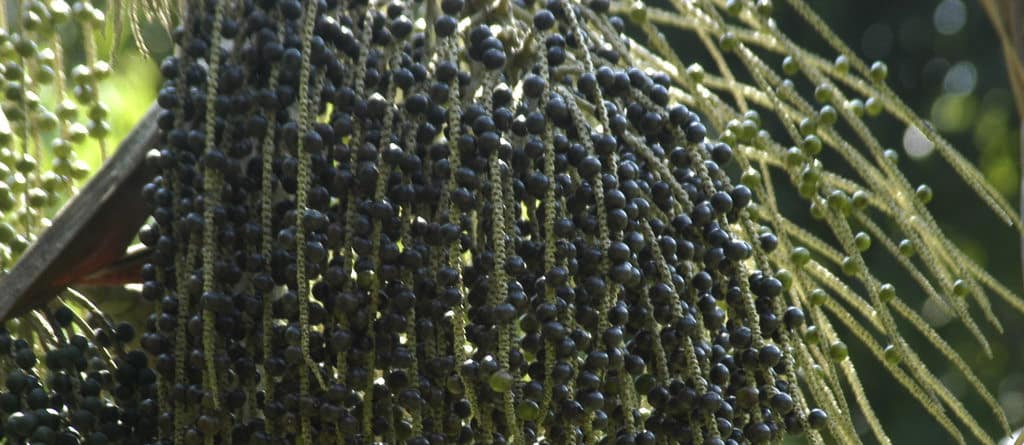An independent review of the effects of açaí berries was recently published, which included studies on immune function, arthritis, and metabolic parameters. The “Evidence-Based Systematic Review of Acai” was issued by the Natural Standards Research Collaboration (NSRC), an impartial scientific body that refuses to take support from product manufacturers. They are cited by the World Health Organization as one of the most authoritative sources on such matters. What did the NSRC find?
Whenever a new purported superfood hits the market, the first thing researchers tend to look at its chemistry such as antioxidant capacity, which was done back in 2006. Based on one measure of antioxidants, it had “the highest of any food reported to date.” I’ve since unveiled Antioxidant Content of 3,139 Foods, and while açaí’s title has been stripped, it’s still high in the list. Despite its cost, frozen açaí pulp represents one of the best antioxidant bangs for our buck. We still didn’t know what it did outside of a test tube, though.
The next step is to go from test tube to petri dish and try it out on some human cells. They dripped the concentration of açaí berry phytonutrients expected in one’s bloodstream after consumption on some cancer cells taken from a 36-year-old woman with leukemia. They saw a dramatic rise in cancer cell mortality–about twice that found previously using similar concentrations of hibiscus tea on the same cancer.
Açaí was also found to boost immune cell function at extremely low doses. If you watch my 5-min video Clinical Studies on Acai Berries you can see actual footage of a human white blood cell gobbling up some invading yeast cells. Sprinkle some açaí berry powder on them and they gobble more. With no açaí for breakfast, white blood cells were able to engulf about 140 yeast, but in the presence of tiny amounts of açaí they engulfed closer to 200. Slowly but surely researchers began piecing together the mechanism by which açaí affected cellular function. Still, no human studies had yet appeared.
Researchers moved from cells to animal models. Who can forget the paper “Addition of Açaí to Cigarettes has a Protective Effect Against Emphysema in Mice” from my video Treating COPD With Diet? Instead of adding berries to their cigarettes, though, maybe mice shouldn’t be smoking.
Then, finally, starting in 2011, studies on actual people. The first paper, “Pain Reduction and Improvement in Range of Motion After Daily Consumption of an Açaí,” studied about a dozen folks with painful conditions like osteoarthritis. After 3 months, antioxidant levels went up, and pain levels went down. However, since there was no blinded control group drinking some kind of artificially açaí-flavored Kool-Aid, placebo effects cannot be excluded.
The only other clinical study investigated the effects of açaí berries on metabolic parameters. Ten overweight folks were given two packs of frozen açaí pulp every day for a month. Even though they were allowed to take it with sugar, their fasting blood sugars dropped, as well as their insulin levels and cholesterol. It appeared to significantly blunt the sugar spike caused by a standardized meal–all without any obvious adverse effects. In fact the only theoretical concern cited in the NSRC review was that it may work too well. If you’re on diabetic blood sugar lowering medications it could potentially drop your blood sugar too low, or if you have an autoimmune disease or are on immunosuppressants it could stimulate your immune system too much.
Caution: there was a case report of a guy whose muscles started dissolving after using an açaí berry supplement. But it turns out there were no açaí berries in it at all! That’s the problem with taking supplements; the industry is so poorly regulated you never know what you’re getting.
A study was done on 27 supplements of another purported superfruit, pomegranate. Of the 27 tested only 5 appeared to be what the labels actually said. Fine, you say, no pills—you’ll just stick to the juice. Another study looked at 45 commercial pomegranate juice samples from 23 different manufacturers in the United States. They each said 100% pomegranate juice on the label, but most of them lied. Only 6 out of 23 were what they said they were. The only source where you can be guaranteed to get authentic pomegranate juice has no label at all—the fruit itself!
I also have a video about pomegranate juice claims: Is Pomegranate Juice That Wonderful? And what’s true of pomegranate juice is true of other juices (Best Fruit Juice) with one exception (The Fruit Whose Juice Is Healthier).
Even if supplements contain what they say, they may not be useful (Dietary Supplement Snake Oil) and sometimes it’s what’s added rather than what’s missing that’s the problem (Some Ayurvedic Medicine Worse Than Lead Paint Exposure).
The beneficial effects of açaí berries do not appear to be unique. Indian gooseberries may also help control blood sugar (Amla Versus Diabetes). In fact, plant-based diets in general may help metabolic parameters (Metabolic Syndrome and Plant-Based Diets).
-Michael Greger, M.D.
PS: If you haven’t yet, you can subscribe to my videos for free by clicking here and watch my full 2012 – 2015 presentations Uprooting the Leading Causes of Death, More than an Apple a Day, From Table to Able, and Food as Medicine.
